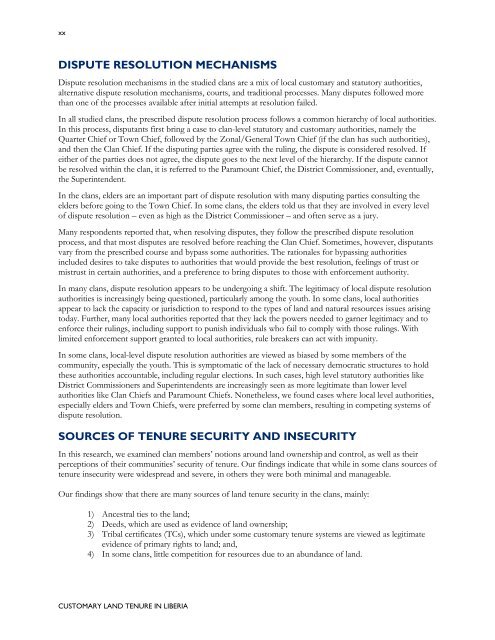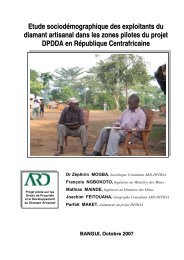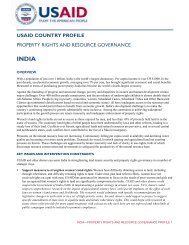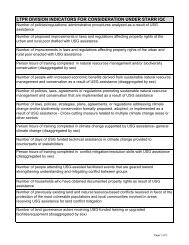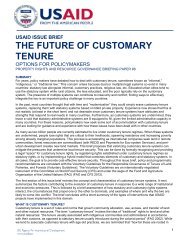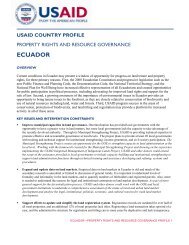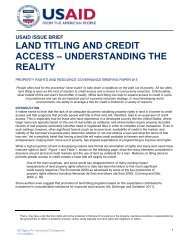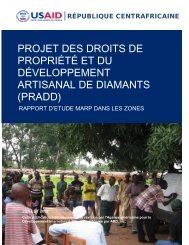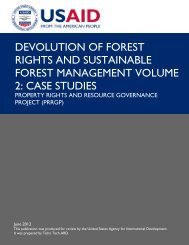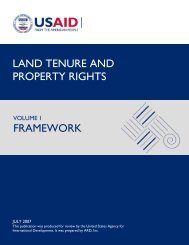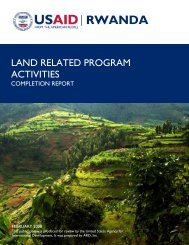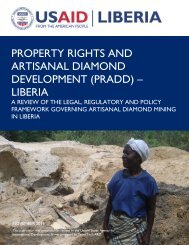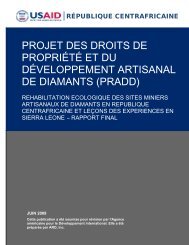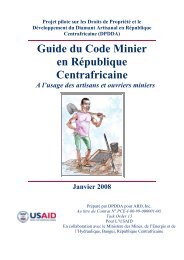Customary Land Tenure in Liberia - Land Tenure and Property ...
Customary Land Tenure in Liberia - Land Tenure and Property ...
Customary Land Tenure in Liberia - Land Tenure and Property ...
Create successful ePaper yourself
Turn your PDF publications into a flip-book with our unique Google optimized e-Paper software.
xx<br />
DISPUTE RESOLUTION MECHANISMS<br />
Dispute resolution mechanisms <strong>in</strong> the studied clans are a mix of local customary <strong>and</strong> statutory authorities,<br />
alternative dispute resolution mechanisms, courts, <strong>and</strong> traditional processes. Many disputes followed more<br />
than one of the processes available after <strong>in</strong>itial attempts at resolution failed.<br />
In all studied clans, the prescribed dispute resolution process follows a common hierarchy of local authorities.<br />
In this process, disputants first br<strong>in</strong>g a case to clan-level statutory <strong>and</strong> customary authorities, namely the<br />
Quarter Chief or Town Chief, followed by the Zonal/General Town Chief (if the clan has such authorities),<br />
<strong>and</strong> then the Clan Chief. If the disput<strong>in</strong>g parties agree with the rul<strong>in</strong>g, the dispute is considered resolved. If<br />
either of the parties does not agree, the dispute goes to the next level of the hierarchy. If the dispute cannot<br />
be resolved with<strong>in</strong> the clan, it is referred to the Paramount Chief, the District Commissioner, <strong>and</strong>, eventually,<br />
the Super<strong>in</strong>tendent.<br />
In the clans, elders are an important part of dispute resolution with many disput<strong>in</strong>g parties consult<strong>in</strong>g the<br />
elders before go<strong>in</strong>g to the Town Chief. In some clans, the elders told us that they are <strong>in</strong>volved <strong>in</strong> every level<br />
of dispute resolution – even as high as the District Commissioner – <strong>and</strong> often serve as a jury.<br />
Many respondents reported that, when resolv<strong>in</strong>g disputes, they follow the prescribed dispute resolution<br />
process, <strong>and</strong> that most disputes are resolved before reach<strong>in</strong>g the Clan Chief. Sometimes, however, disputants<br />
vary from the prescribed course <strong>and</strong> bypass some authorities. The rationales for bypass<strong>in</strong>g authorities<br />
<strong>in</strong>cluded desires to take disputes to authorities that would provide the best resolution, feel<strong>in</strong>gs of trust or<br />
mistrust <strong>in</strong> certa<strong>in</strong> authorities, <strong>and</strong> a preference to br<strong>in</strong>g disputes to those with enforcement authority.<br />
In many clans, dispute resolution appears to be undergo<strong>in</strong>g a shift. The legitimacy of local dispute resolution<br />
authorities is <strong>in</strong>creas<strong>in</strong>gly be<strong>in</strong>g questioned, particularly among the youth. In some clans, local authorities<br />
appear to lack the capacity or jurisdiction to respond to the types of l<strong>and</strong> <strong>and</strong> natural resources issues aris<strong>in</strong>g<br />
today. Further, many local authorities reported that they lack the powers needed to garner legitimacy <strong>and</strong> to<br />
enforce their rul<strong>in</strong>gs, <strong>in</strong>clud<strong>in</strong>g support to punish <strong>in</strong>dividuals who fail to comply with those rul<strong>in</strong>gs. With<br />
limited enforcement support granted to local authorities, rule breakers can act with impunity.<br />
In some clans, local-level dispute resolution authorities are viewed as biased by some members of the<br />
community, especially the youth. This is symptomatic of the lack of necessary democratic structures to hold<br />
these authorities accountable, <strong>in</strong>clud<strong>in</strong>g regular elections. In such cases, high level statutory authorities like<br />
District Commissioners <strong>and</strong> Super<strong>in</strong>tendents are <strong>in</strong>creas<strong>in</strong>gly seen as more legitimate than lower level<br />
authorities like Clan Chiefs <strong>and</strong> Paramount Chiefs. Nonetheless, we found cases where local level authorities,<br />
especially elders <strong>and</strong> Town Chiefs, were preferred by some clan members, result<strong>in</strong>g <strong>in</strong> compet<strong>in</strong>g systems of<br />
dispute resolution.<br />
SOURCES OF TENURE SECURITY AND INSECURITY<br />
In this research, we exam<strong>in</strong>ed clan members‟ notions around l<strong>and</strong> ownership <strong>and</strong> control, as well as their<br />
perceptions of their communities‟ security of tenure. Our f<strong>in</strong>d<strong>in</strong>gs <strong>in</strong>dicate that while <strong>in</strong> some clans sources of<br />
tenure <strong>in</strong>security were widespread <strong>and</strong> severe, <strong>in</strong> others they were both m<strong>in</strong>imal <strong>and</strong> manageable.<br />
Our f<strong>in</strong>d<strong>in</strong>gs show that there are many sources of l<strong>and</strong> tenure security <strong>in</strong> the clans, ma<strong>in</strong>ly:<br />
1) Ancestral ties to the l<strong>and</strong>;<br />
2) Deeds, which are used as evidence of l<strong>and</strong> ownership;<br />
3) Tribal certificates (TCs), which under some customary tenure systems are viewed as legitimate<br />
evidence of primary rights to l<strong>and</strong>; <strong>and</strong>,<br />
4) In some clans, little competition for resources due to an abundance of l<strong>and</strong>.<br />
CUSTOMARY LAND TENURE IN LIBERIA


